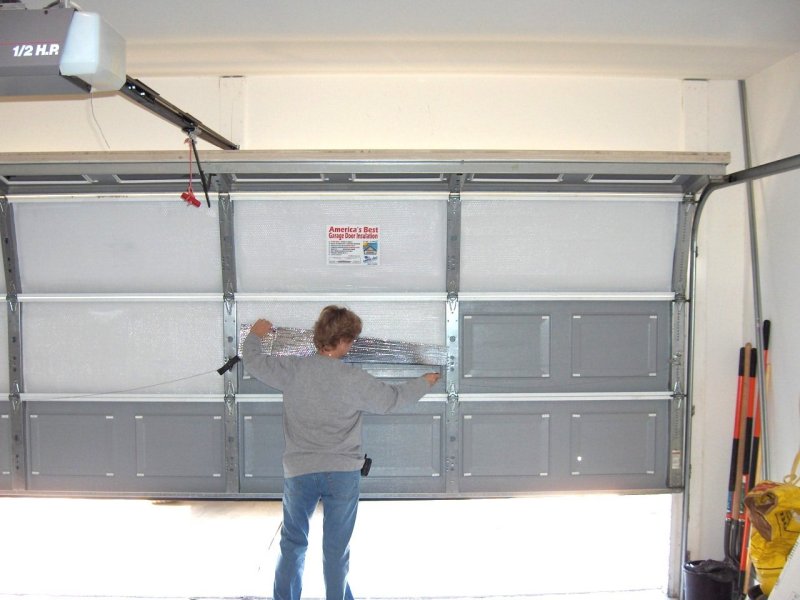Is Garage Door Insulation Worth It?

One of the first features people notice when they look at your home is your garage door, which adds aesthetic and an extra entry. Since the entryway of your garage door is typically the largest in your house, it may also be a significant source of heat loss. Therefore, there is a lot of money lost on cooling and heating as well as draughty rooms in the colder months and humid, hot living spaces in the summertime.
Many homeowners may question if they must have garage door insulation to aid with these problems, particularly those who live in regions with temperatures or extreme weather. Along with helping you save money by improving energy efficiency, garage door insulation offers a number of advantages. A DIY insulation kit and an expert house insulation can all be used to insulate. The last option can improve the comfort and energy efficiency of your home as well as its aesthetic appeal.
Why Is Garage Door Insulation Important?
Your garage door is strengthened and protected further by insulation. A well-insulated garage door will maintain a constant temperature in your garage, frequently saving you cash on energy costs. The ecology benefits from this energy efficiency as well. Additionally, house insulation doors can shield your garage’s assets from bad weather and break-ins.
What Effect Do Garage Doors Have on Insulation?
Insulation has an equivalent effect on garage doors with windows. But windows are making insulation more difficult. Double-paned windows will provide an additional layer of insulation when used with insulated doorways with windows, provided that they are set up and sealed properly.
The Advantage of Garage Door Insulation
An insulated door can offer a number of advantages, depending on the design and location of your garage area. Even unattached garage spaces can gain from insulation, particularly in regions with extreme weather. Houses with attached garages may gain the most from insulating the door.
- Use of Garage Space
Warmer garage temperatures may be achieved with insulated garage doors. The temperature inside the garage might really be almost twenty degrees hotter than the outside air, thanks to an insulated garage door. The difference between a garage at below-freezing temperatures and one that is above it might vary in severity depending on the R-value of the door.
A frozen garage implies frozen plumbing and a non-starting car for many people who live in colder areas. Since many people utilise their garage space for preservation, an insulated door can offer a more suitable setting for keeping things like paint, oils, pictures, and food goods that need to be protected from extreme humidity and temperature.
- Quieter Performance
Compared to non-insulated doors, insulated house insulation operates much more quietly. The insulation strengthens the door and lessens rattling and creaking. Although an insulated door can reduce some of the noise and vibration produced by the operation, if noises are being produced, it is crucial to have the track mechanism, which includes the rollers, chains, springs, and hinges, evaluated by an expert.
If you frequently use your garage door as an entrance or if there are living spaces above or next to the garage, a quieter performance is very advantageous. Additionally, serving as an acoustic barrier, insulated doorways muffle outside noises.
- Improved Energy Efficiency
By stopping hot air from accessing your garage during warmer weather and keeping heat from exiting in the winter, garage insulation aids in reducing energy loss. The amount of energy required to heat and cool your home is reduced thanks to the improved climate control and comfortable temperature within the garage.
As a result, you may spend less on heating and cooling because you won’t need to use as much conditioned air to keep your home at a suitable temperature. If your garage is adjacent to your home, an insulated garage door can help prevent heat and cold air from getting into hallways, busy rooms and areas above the garage. Garage doors with insulation reduce heat loss that occurs even when they are closed.
- More Convenient Home and Garage
Your home and garage will be warmer and cosier with an insulated garage door. It will reduce the amount of chilly draughts that enter the home from the garage and prevent hot air from entering during the warmer months. You may even be able to use your garage all over the entire year if your doors have a higher level of insulation.
Even though you have to insulate the ceilings and walls and add drywall in order to utilise your garage as an extra living space, having an insulated door creates a better atmosphere for storage, automobiles, crafts and hobbies, or even just moving in and out of the house. A new house insulation door undoubtedly tops the list of the best home renovation projects you can undertake, given the extensive range of benefits.
- Better Door Strength
In general, an insulated door is stronger than an uninsulated door. It can withstand repeated closing and opening and is more resilient to dents and breakage from vehicles, youngsters, the environment, and regular use. Insulated garage doors also prevent rusting, which is a common problem with single-layer, non-insulated doors.
Modern insulated doors are often constructed with steel frames sandwiched between layers of solid insulation, making them both durable and light. They are built to last and to withstand environmental factors like heat, sunlight, and wind that could limit the longevity of non-insulated doors.


